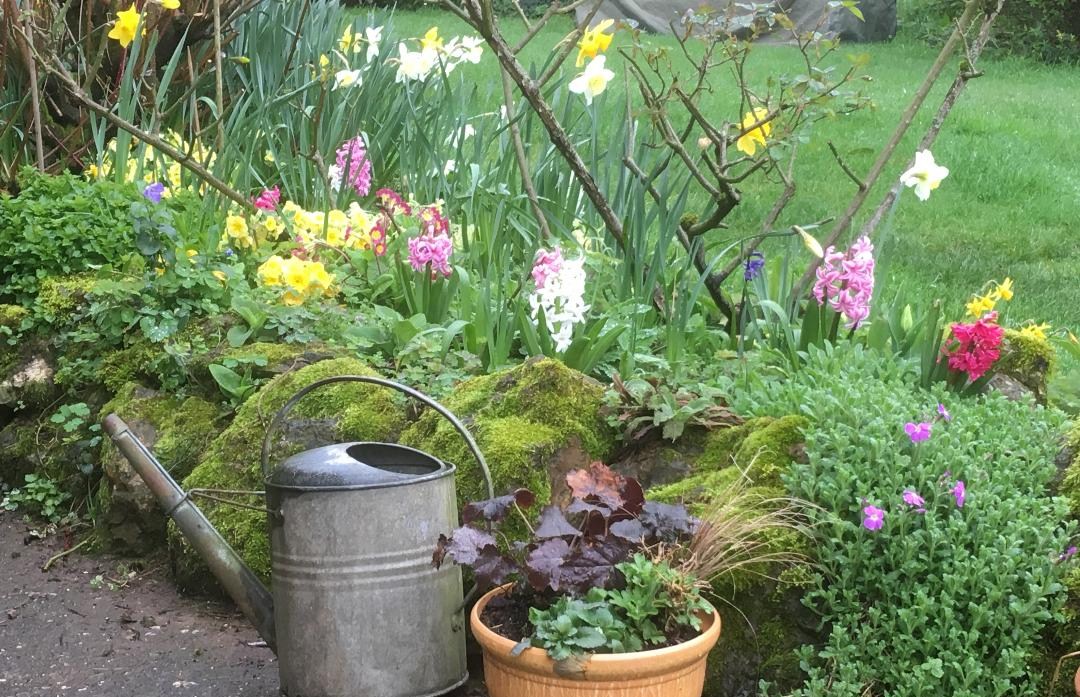21 March 2019
So Much to Celebrate.
Bugger Brexit! It’s Spring!
By Lynda Goetz
 It would have been very easy to give in to the temptation to rant about Brexit this week. Who doesn’t want to? Whether you were/are a Remainer or a Leaver, the current mess into which PM, Government and Parliament have led us suits no-one. There appears to be little light at the end of the tunnel and to use the words of one journalist, ‘we are all suffering from Brexaustion’. So, for this reason and the fact that pretty much all there is to be said about the subject has probably been said, mooted or pontificated upon, it seemed prudent to leave that subject well alone.
It would have been very easy to give in to the temptation to rant about Brexit this week. Who doesn’t want to? Whether you were/are a Remainer or a Leaver, the current mess into which PM, Government and Parliament have led us suits no-one. There appears to be little light at the end of the tunnel and to use the words of one journalist, ‘we are all suffering from Brexaustion’. So, for this reason and the fact that pretty much all there is to be said about the subject has probably been said, mooted or pontificated upon, it seemed prudent to leave that subject well alone.
A next thought was the police, the current level of violent crime; their complaints about numbers and overwork and the question of Surrey police calling in Roman Catholic journalist, Caroline Farrow, to interview her about her possible ‘hate crime’ with regard to ‘misgendering’ (I think that could be a word, possibly) the offspring of a Ms Green with whom she had had some sort of run in on a television programme. Well, on Wednesday it formed part of the BBC news on R4’s Today programme; The Telegraph led with it on the front page and had an editorial on the subject and both Sara Thornton and Cressida Dick had already expressed their opinions on policing priorities; so what really was the point in my adding my non-expert opinion to the mix? I decided to give that one a miss too.
 Then I got a WhatsApp message from my daughter who has spent the winter in the mountains of Canada improving her skiing. ‘Spring has well and truly arrived here’, she wrote. Having done a season in the Alps myself many moons ago, I knew how that felt. However keen a skier you are and however much you love what new falls of snow mean for the delights of off-piste skiing, there comes a moment when it begins to feel like time for winter to end; time for the monochromes of whites, greys and blacks (with the occasional deep blue of the sky on sunny days and some stunning sunsets, admittedly) to give way to the wider palette of the next season. I sent her a picture of the primulas, daffodils and hyacinths already providing colour in the garden here; plus a couple of the wildflowers which have been flowering in the hedgerows in the mildness of our wet southwestern winter for some while now. Her response was immediate: “Beautiful. I am so excited for spring.”
Then I got a WhatsApp message from my daughter who has spent the winter in the mountains of Canada improving her skiing. ‘Spring has well and truly arrived here’, she wrote. Having done a season in the Alps myself many moons ago, I knew how that felt. However keen a skier you are and however much you love what new falls of snow mean for the delights of off-piste skiing, there comes a moment when it begins to feel like time for winter to end; time for the monochromes of whites, greys and blacks (with the occasional deep blue of the sky on sunny days and some stunning sunsets, admittedly) to give way to the wider palette of the next season. I sent her a picture of the primulas, daffodils and hyacinths already providing colour in the garden here; plus a couple of the wildflowers which have been flowering in the hedgerows in the mildness of our wet southwestern winter for some while now. Her response was immediate: “Beautiful. I am so excited for spring.”
What a great sentiment. She is so right. Bugger Brexit. Something will emerge out of the current chaos and life (and death) will, of course, go on. Politicians may need to address the issue of policing priorities (once they have got their own sorted out perhaps), but for the rest of us, we should be excited about spring. We should be grateful that each year the seasons change; our planet continues its orbit around the sun and we see the renewal of life enacted before our eyes. The trees come to life; the grass grows; lambs are born; the crops which farmers have planted germinate and shoot forth; the flowers we have planted in our own small plots repay our care and light up even the greyest of days. For now we are lucky and spring gives way to summer; summer to autumn and autumn to winter in a cycle which has continued for millennia.
 Wednesday 20th March (yesterday) was the Spring Equinox in the Northern Hemisphere, the day when astronomical (as opposed to meteorological) spring officially starts. The BBC celebrate by readings of Poems for the Spring Equinox and the website Interesting Literature offers a collection of 10 spring poems everyone should read, including the opening lines from Chaucer’s Canterbury Tales. This is a small reminder that humans have not changed much over the years – even if technology has.
Wednesday 20th March (yesterday) was the Spring Equinox in the Northern Hemisphere, the day when astronomical (as opposed to meteorological) spring officially starts. The BBC celebrate by readings of Poems for the Spring Equinox and the website Interesting Literature offers a collection of 10 spring poems everyone should read, including the opening lines from Chaucer’s Canterbury Tales. This is a small reminder that humans have not changed much over the years – even if technology has.
Our technology has however changed our planet. In spite of the ‘climate-change deniers’ and the undoubted fact that although the planet does also change in ways that have nothing to do with humans, scientific evidence increasingly points toward the deleterious effects our technologies are having on the planet. On Radio 4’s The Life Scientific, on Monday, Jim Al-Khalili interviewed Corinne le Quere, a climate scientist whose particular area of research is the global carbon cycle, but in particular, the response of the natural cycle to the emissions which we are putting into the atmosphere. She has no doubt that human carbon emissions are causing an imbalance in the whole system.
In Southern Africa currently, Mozambique is the worst affected country hit by Cyclone Idai, the tenth named storm of the winter and apparently one of the worst tropical cyclones recorded. Scientists consider that the increasing ferocity of natural disasters such as Cyclone Idai is connected to climate change. The coastal city of Beira appears to have suffered most and the President of Mozambique has said that at least 1,000 people may be dead. 400,000 have been left homeless. Not good news for International Happiness Day, which was also on Wednesday, but then ‘happiness’ is unlikely to be experienced universally on a designated day, however much UN special advisers may wish for this to happen.
All of us, whether in the Northern Hemisphere celebrating the Spring Equinox or in the Southern experiencing the effects of a worse-than-usual Autumn Equinox storm, owe our existence, and to some extent our happiness, to this fragile planet on which we live. We cannot always control its storms, its weather or its terrible natural disasters. Where we are responsible, however, for nuclear disasters*, for famines caused by wars or policies, or for plastic pollution due to our lifestyles, we need to take responsibility, each and every one of us. As Corinne Le Quere says, ‘human beings behave in irrational ways’. Even, she admits, people like herself, who are only too well aware of the issues, will frequently put immediate personal gratification over long-term needs of society and the planet. She says that scientists ‘need to bring people with us’; essentially to get them on board with the problems and to show them what they as individuals can do to make a difference as well as moving governments to manage things ‘informed by the science’. She considers that the technology is increasingly in place to make changes and that we are approaching the tipping point where people are beginning to realise the importance of making those changes – even if perhaps many are still looking to those in power to ‘sort things out’ ( a hope which, we have all been reminded recently, is almost certainly misplaced).
Not to worry though, in the meantime we can enjoy celebrating the Hindu Holi festival (which takes place on 20th and 21st March) and signifies the triumph of good over evil, the end of winter and the onset of spring. Although this ancient religious festival originated in India and Nepal, it is now celebrated around the world, including in the UK. No need to wait for the colour of spring flowers either. Celebrants throw coloured powders over each other after lighting bonfires and enjoying singing and dancing the previous night. ‘Nowruz’ is the name of the Persian or Iranian New Year, also celebrated with bonfires; and in Japan the arrival of spring is heralded by the cherry blossom (sakura) which is a national preoccupation at this time of year with forecasts and announcements of the dates on which different cities will have the trees in full bloom. Should you prefer not to be anywhere in the UK or Europe at the end of next week, the cherry blossoms in Tokyo and Yokahama are forecast to be at their best March 28th and in Kochi on 29th. If you haven’t seen them in their full glory now would seem to be a good time to go.
*A new book out by Kate Brown, Manual for Survival, published by Allen Lane this week and extracted for the Telegraph Magazine last weekend, suggests that the number of deaths caused by the Chernobyl disaster was somewhere between 35,000 and 150,000 – rather than the 49, 50 or 54 variously officially admitted to by the Soviet regime.


